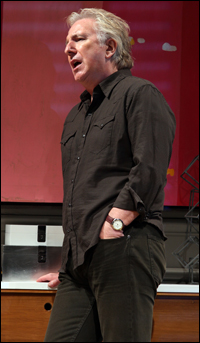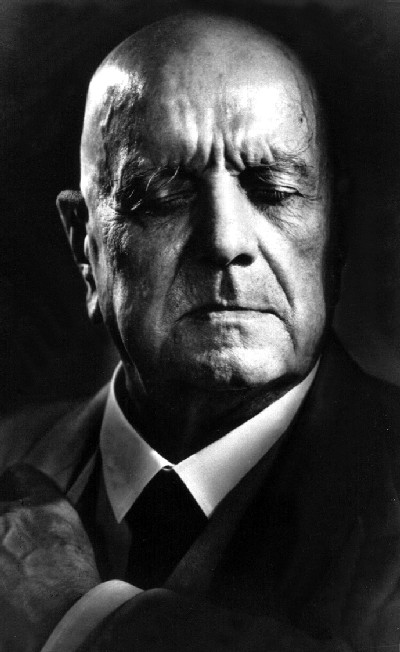In today’s Wall Street Journal drama column I report on the premiere of Seminar, Theresa Rebeck’s new play. Here’s an excerpt.
* * *
 Nobody does nasty like Alan Rickman, and in “Seminar,” Theresa Rebeck’s new play, he goes the whole hog, playing a monstrously brutal teacher who hates his students almost as much as he hates himself. It’s no surprise that the man who brought Severus Snape to the screen should be so good at spewing verbal cyanide onstage. To hear him dismiss a short story written by one of his hapless charges as “a soul-sucking waste of words” is to know what a mouse feels like as it peers down the mouth of an ill-fed snake. What’s surprising and gratifying about “Seminar” is that Ms. Rebeck, a prolific playwright with a hit-or-miss average, should have connected so firmly with the dramatic ball this time at bat. Like “The Understudy,” her last play, “Seminar” is an intermission-free comedy that gets serious at the halfway point, and for all the shiny slickness of its surface, Ms. Rebeck has once again contrived to conjure up a stageful of too-clever-for-their-own-good characters who’ll sneak right under your skin.
Nobody does nasty like Alan Rickman, and in “Seminar,” Theresa Rebeck’s new play, he goes the whole hog, playing a monstrously brutal teacher who hates his students almost as much as he hates himself. It’s no surprise that the man who brought Severus Snape to the screen should be so good at spewing verbal cyanide onstage. To hear him dismiss a short story written by one of his hapless charges as “a soul-sucking waste of words” is to know what a mouse feels like as it peers down the mouth of an ill-fed snake. What’s surprising and gratifying about “Seminar” is that Ms. Rebeck, a prolific playwright with a hit-or-miss average, should have connected so firmly with the dramatic ball this time at bat. Like “The Understudy,” her last play, “Seminar” is an intermission-free comedy that gets serious at the halfway point, and for all the shiny slickness of its surface, Ms. Rebeck has once again contrived to conjure up a stageful of too-clever-for-their-own-good characters who’ll sneak right under your skin.
The premise of “Seminar” requires explaining, since it will undoubtedly be alien to anyone who hasn’t dipped a toe into the creative-writing racket. Mr. Rickman plays Leonard, a burned-out novelist turned high-octane book editor who makes extra cash on the side by leading private seminars in The Fine Art of Getting Published. Pony up $5,000 and you get to participate in 10 kick-me sessions at which he tells a small group of up-and-coming young writers what dim-witted boobs they are…
It goes without saying that Mr. Rickman is the star of the show. Ms. Rebeck has given him a lengthy speech about unsuccessful writers (“You’ll feel like you’re in the ninth circle of hell, where the betrayers of Christ are frozen in eternal cannibalistic silence”) that he delivers as if it were an operatic aria, using his hissing, sinister drawl to color each phrase so tellingly that you’ll catch your breath from start to finish. But “Seminar” is in no way a one-man show, and Mr. Rickman’s “supporting” cast backs him brilliantly and effortlessly….
* * *
Read the whole thing here.
Archives for November 25, 2011
TT: When art goes up in smoke
Today’s Wall Street Journal “Sightings” column is occasioned by the recent discovery of sketches for Sibelius’ Eighth Symphony. Here’s an excerpt.
* * *
The most famous bonfire in the history of classical music was lit by Jean Sibelius in 1945. The composer of “Finlandia,” who had succumbed to depression and stopped writing music years earlier, burned a basketful of manuscripts in his fireplace, and it’s thought that his unperformed Eighth Symphony, over which he had struggled for nearly two decades, went up in flames that day.
Or did it?
 The Finnish newspaper Helsingin Sanomat published a story last month called “Is This the Sound of Sibelius’ Lost Eighth Symphony?” Finnish scholars now claim to have located three fragments from Sibelius’ sketches for the Eighth Symphony, and John Storgårds and the Helsinki Philharmonic recently performed them. It’s impossible to know for sure whether these snippets actually belong to the Eighth Symphony, but the possibility that they might has set musicians around the world to buzzing.
The Finnish newspaper Helsingin Sanomat published a story last month called “Is This the Sound of Sibelius’ Lost Eighth Symphony?” Finnish scholars now claim to have located three fragments from Sibelius’ sketches for the Eighth Symphony, and John Storgårds and the Helsinki Philharmonic recently performed them. It’s impossible to know for sure whether these snippets actually belong to the Eighth Symphony, but the possibility that they might has set musicians around the world to buzzing.
Lost, unfinished and destroyed works of art have always tickled the fancies of art lovers, sometimes to the point of outright obsession. Did Buddy Bolden, the legendary New Orleans jazzman, really record a cylinder of his cornet playing? Probably not–but that hasn’t stopped fanatics from looking for it. Whatever happened to the missing finale of Schubert’s “Unfinished” Symphony? Nobody knows–but cockeyed theories abound.
Max Beerbohm wrote an essay called “Quia Imperfectum” in which he reflected on the “peculiar charm” exerted by unfinished works of art, suggesting that it would be worthwhile to construct “a museum of incomplete masterpieces” whose collection would be “full of unfulfillment.” It’s a clever idea, and a thoroughly romantic one. Most of the best-known unfinished works of art, after all, including Bach’s “Art of Fugue,” Charles Dickens’ “Mystery of Edwin Drood,” F. Scott Fitzgerald’s “The Last Tycoon” and Gustav Mahler’s Tenth Symphony, were short-circuited by the deaths of their creators. Just as we are intrigued by the last words of great men, so are we fascinated by the last works of great artists, and when they are left incomplete, the fascination is heightened still further by the universal longing to see beyond the grave.
That Sibelius should have put his Eighth Symphony to the torch is no less fascinating. It’s not unusual for artists to suppress works with which they’re dissatisfied, but rarely do they actually destroy them….
* * *
Read the whole thing here.
To hear a performance of the sketches for Sibelius’ Eighth Symphohy, go here and click on the small video screen. (The music is preceded by a two-minute-long interview in Finnish.)
TT: Almanac
“For many readers a good critic, in whatever field, is someone they agree with or who agrees with them. For me, a good critic is a good writer. A good critic is someone who recognizes and acknowledges the artist’s intentions and the work’s aspirations, and judges the work by them, not by what his own objectives would have been. A good critic is so impassioned about his subject that he can persuade you to attend something you’d never have imagined going to. A good critic is an entertaining read. A good critic is hard to find.”
Stephen Sondheim, Look, I Made a Hat: Collected Lyrics (1981-2011) with Attendant Comments, Amplifications, Dogmas, Harangues, Digressions, Anecdotes and Miscellany
